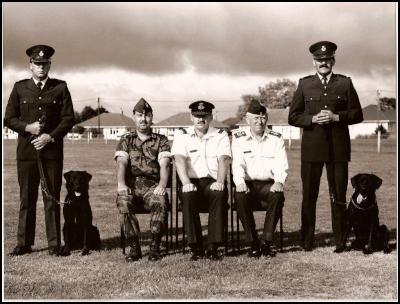25 Years of Corrections’ Dog Section
For Immediate Release 7 September 2016
25 Years of Corrections’ Dog Section

Corrections first dog handlers, Barry Gerbrich and Moses Toeke and their dogs, 25 years ago.
This year marks a significant milestone for Corrections’ Dog Section as it celebrates 25 years since the first Corrections drug detector dogs were used in New Zealand prisons.
Mo Toeke and Barrie Gerbich, and their dogs Alf and Nick, were Corrections’ first Drug Dog Handlers and are still with the Department today after returning from gaining operational experience elsewhere and overseas corrections departments.
They originally trained with the Air Force Military Police Dog Section in Auckland, completing a full narcotic detection dog handler’s course. After successfully searching cells and perimeters at Auckland Medium Security Prison (now Auckland Prison), a four week pilot search programme was trialled across the country with great results, uncovering large amounts of contraband.
“Before our dogs, our staff had to do all searches by hand which was extremely time consuming,” says Barrie. “If a prison was lucky enough, a Police or Customs dog would assist but this was very rare, usually once a year for a morning.”
“With the dogs on board, searching a cell block could be done successfully in a matter of minutes with a couple of specialised staff instead of what used to take hours with a lot of staff.”
The Dog Section has grown a lot in the past 25 years and seen the original team of two handlers grow to a team of 15 today and 26 dogs.
“It hasn’t been an easy journey to get the Dog Section to where it is today,” says Mo. “In particular for our families, who play a huge and sometimes unrecognised role, in the training and bringing up of our dogs.”
Tony Coyle was a previous manager of the Corrections Dog Section for a large part of its history and is also still working with the Department. Tony is very proud seeing the progress of Corrections Dog Section.
“The Dog Section has come a long way and it’s very encouraging to see such positive results and response to the team and of course, the dogs.”
“Training tobacco and cellphone detector dogs in addition to our drug detector dogs, are two of the many ways the Dog Section has developed and adapted to changing demands of new policies and legislation, new types of contraband and new methods of introducing contraband into our prisons,” says Tony.
John Gallagher is the current manager of the Dog Section and says “A good example of how capability has been developed within Corrections over the past few years is that Corrections is now managing all dog and handler training internally, rather than being reliant on other agencies as we have in the past.”
“Our training programme and the way we select quality puppies has now been adopted by other agencies,” says John. “I think it is fair to say that the Correction Detector Dog Team is seen as a very credible and professional dog team across the wider NZ working dog world.”
Mo the success of the Dog section team continues. “The future for the Dog Section is looking good,” says Mo.
“Being a dog handler is something our young officers can aspire to,” says Mo. When asked for advice for anyone hoping to be part of the next 25 years of the Dog Section history he says, “commitment as well as familiarity and confidence in working with prisoners is key.”
ENDS


 Gordon Campbell: On Justin Trudeau’s Demise, In A Global Context
Gordon Campbell: On Justin Trudeau’s Demise, In A Global Context Justice Committee: Justice Committee Reopens Submissions For Principles Of The Treaty Of Waitangi Bill To Tuesday 14 January
Justice Committee: Justice Committee Reopens Submissions For Principles Of The Treaty Of Waitangi Bill To Tuesday 14 January NZCAST: Survivors Of Abuse In Care Left Waiting - Urgent Action Needed Following Apology
NZCAST: Survivors Of Abuse In Care Left Waiting - Urgent Action Needed Following Apology Ōnuku Rūnanga: No One Wants Wastewater In Akaroa Harbour
Ōnuku Rūnanga: No One Wants Wastewater In Akaroa Harbour NZ Police: Funeral For Senior Sergeant Lyn Fleming Confirmed
NZ Police: Funeral For Senior Sergeant Lyn Fleming Confirmed NZ Police: Making Waves On The World Stage
NZ Police: Making Waves On The World Stage ACT New Zealand: Too Many Kiwis Denied The Chance To Gather With Loved Ones At The End Of Life
ACT New Zealand: Too Many Kiwis Denied The Chance To Gather With Loved Ones At The End Of Life


